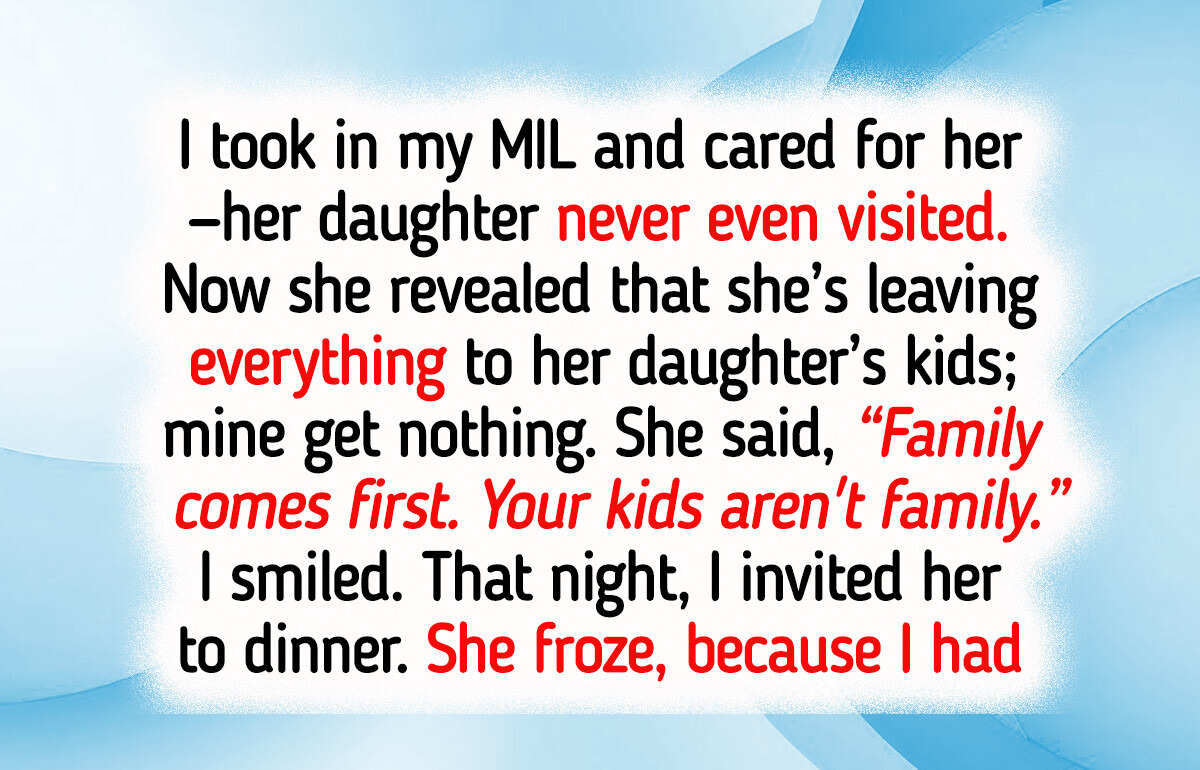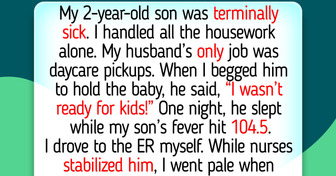It's also your home and this is what it cost you to care for her. Which, btw, you'll never do again. Recommend she start looking for a retirement home if her daughter won't take her in. But, you won't.
If your husband says he'll leave you tell that's ok, he can move in and care for her himself.
My MIL Excluded My Kids From Her Will—So I Made Sure She Got What She Deserved

Families are often complicated, and tensions can run deep—especially when it comes to blended households, inheritance, and long-held grudges. Many people go above and beyond for their in-laws, only to find themselves hurt by unexpected betrayals. These moments raise tough questions about loyalty, fairness, and boundaries.
One woman recently sent us a letter about a painful experience with her mother-in-law that sparked a powerful response.
Mia’s letter:

Dear Bright Side,
I took in my mother-in-law and cared for her for eight years, while her own daughter never even visited. I’ve been married to my husband for ten years. We don’t have children together, but he’s raised my three kids as if they were his own.
Recently, my MIL revealed that she’s leaving everything to her daughter’s children—mine get nothing. She said, “Family comes first. Your kids aren’t family.” I just smiled.
That night, I invited her to dinner. At the end of the meal, she froze—because I had placed three notebooks on the table, filled to the brim with all the bills she had cost us over those eight years.
She was shocked to realize that I had been keeping track of everything: her medical bills, groceries, meals, laundry costs—every single detail.
I never expected to show her the notebooks or ask her to pay us back. I had only kept the records to manage our finances. But when she told me my kids weren’t family, it pushed me over the edge.
I demanded that she repay us for everything, since according to her, “We’re not family!”
My husband was surprised by my reaction. My mother-in-law frowned and said I had no right to ask her for money—after all, she’s been living in her son’s house.
But I think I’m being reasonable. Do you think I’m wrong—or fair—for doing this?
—Mia
Mia, thank you for sharing your story—it’s deeply personal and complex, and your hurt is absolutely valid. Here are 4 strategies to consider, tailored to your unique situation.
Reframe the narrative with your husband—privately and honestly.

Your husband’s surprise at your reaction likely means he doesn’t fully understand the emotional toll of hearing that your children—whom he helped raise—are considered “not family” by his own mother.
Take the time to explain how that single comment cut deeper than any financial slight, especially after eight years of caregiving with no complaint.
This conversation isn’t about demanding he take sides, but about helping him recognize the emotional weight you’ve been carrying so that future decisions are made from a place of mutual understanding.
Shift the financial record into a legal document.

You’ve already done the hard part by documenting every expense related to her care—something most people never think to do—so it’s worth consulting a legal expert to explore whether this can be formalized into a claim or repayment agreement.
Even if you don’t intend to take legal action, turning these records into a structured, written request reframes the dynamic and signals that her dismissal of your family has consequences beyond hurt feelings. It also protects your household from being financially taken for granted again.
Confront the inheritance issue with her and her daughter—directly but respectfully.
Rather than letting resentment simmer beneath the surface, consider asking for a candid conversation with both your mother-in-law and her daughter to address the inheritance decision face to face.
This isn’t to guilt-trip her, but to ask her to consider what message she’s sending after receiving nearly a decade of unconditional care from a family she now claims doesn’t count. Let her see the human cost of that choice—not to change her mind necessarily, but to make sure she owns the emotional consequences of her decision.
Let her go—and set emotional boundaries.
If her words have made it clear that she doesn’t see you or your children as part of her family, it’s reasonable—and even healthy—to step away from the caregiving role you’ve carried for years. You’re not being petty; you’re responding to her terms.
Let her daughter or others who are considered “family” take on those responsibilities going forward. This isn’t about revenge—it’s about preserving your emotional energy for the people in your home who love, support, and recognize the family you’ve built together.
Betty earns a good salary, but she refuses to give any of it back to her parents—and her decision has caused a serious divide in the family. Read her story and let us know: would you have made the same choice?
Comments
Absolutely the BEST response to that vile woman!!! How horrible. Tell her NO more $$ MO more care. Let her daughters kids take care of her!! If hubby doesn't support you RUN. Oh but take EVERYTHING 😊
Related Reads
10 Stories That Prove Kindness Is the Ultimate Superpower

I Gave My Grandkids Their Inheritance at 18 — Their Stepmom Says I Destroyed Her Blended Family

10 Moments of Superhuman Strength That Feel Like Winning the Olympic Games

I Refused to Watch My DIL Give Birth— She Made Sure I Regretted That Moment

15 Stories That Prove Some Memories Are Impossible to Delete

12 Moments That Prove Kindness Can Soften the World’s Hardest Edges

I Refused to Follow My Boss’s Dress Code—HR Had to Step In

15 Heart-Centered Moments of Human Kindness That Only Happen Once in a Blue Moon

My Parents Refused to Fund My Education, So I Turned the Tables on Them

I Refuse to Earn Pennies While My Manager Cashes a Fortune

I Refuse to Give Up the Passenger Seat for My MIL—She Should Learn Her Place

10 Hospital Workers Who Prove Kind Heart Is a Powerful Medicine


